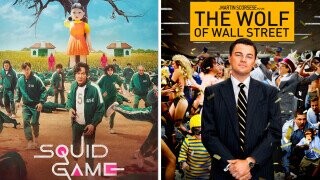4 Hit Movies And Shows (That Got Totally Misinterpreted)

We all know the story of how a certain slice of society decided to take the red pill philosophy from The Matrix — that supposedly shows a person how the world really is — and twist it into their conspiracy-laden, self-constructed fantasies of reality so they can justify their hate and violence toward others. Things really are swell on this here planet.
Truth be told, that's just us humans in a nutshell. We'll all hear the same story or watch the same movie and come away with different, probably biased takes on it because our interpretation will always be relative to our knowledge and experiences. That is why some people will always believe that Thanos "had a point," and why the rest of us will scoff at it because 1) no, and 2) we're busy figuring out why Ant-Man didn't just fly up Thanos' butt.
Don't Miss
It's fine to have different opinions on stuff, but it doesn't automatically make a person right. And people have sure made a hobby out of twisting media content in ways that would make a pretzel look like the golden ratio just so it'll fit their own prerogative …
No, Juno Isn’t Anti-Choice
While the world is still reeling at the Supreme Court’s decision to overturn Roe vs. Wade and make it exponentially harder for women around the U.S. to deal with unwanted and/or deadly pregnancies, some folks have claimed Diablo Cody’s indie movie starring Elliot Page as their banner of anti-choice representation. How? Because of this scene:
Even though that scene — which Cody says she kind of regrets because she didn’t think it would be so misconstrued — shows an anti-abortionist aid in Juno’s change of heart, anti-choice supporters seem to forget one thing: Juno still had a choice, and she made her own. She wasn’t forced to have an abortion/not have an abortion. The movie is about the journey of a coming-of-age teenager who learns how to make her own choices. It’s not some cautionary, anti-abortion tale. It’s about a messy world with messy people who’re all just trying to figure out how they feel and what they want to do.
When the film was released, Cody was shocked when she received a letter from a Catholic high school that praised her for writing a movie that was “in line with the school’s values.” She has since been pretty vocal about her stance on the matter: “I do think it’s important that I continue to clarify my feelings about it because the last thing I would ever want is for someone to interpret the movie as anti-choice. That is a huge paranoia of mine.”
No,Have you seen The Northman yet? It’s that movie where Alexander Skarsgård and Claes Bang fight each other naked while roasting their nuts because they’re also on top of a volcano. It’s, uh, well … it’s nuts.
The film is based on the legend of Amleth — a character from medieval Scandinavian legend who also inspired Shakespeare’s Prince Hamlet — and the movie follows Amleth, a Viking prince, on his journey to avenge his slain father. So far, so men. Director Robert Eggers has straight-up said that he wanted to make this film to reclaim Viking mythology from white supremacists who have clung to the fantasies of European mythologies where men were all-powerful, women were nothing but womb slaves, and racial mixing was seemingly non-existing.
Those a-holes are why Eggers almost didn’t make the film: “The macho stereotype of that history, along with, you know, the right-wing misappropriation of Viking culture, made me sort of allergic to it, and I just never wanted to go there.” Of course, he totally ended up going there, and prior to the film’s release, 4chan message boards were already going off about the “raw masculinity” and the “all white cast” and Eggers “restoring pride in our people'' because folks will always want to latch onto some idea of supposed greatness to distract from their puny existence in a gigantic universe.
It also didn’t help that Skarsgård character …

Focus Features
… made right-wing groups think of their dumb hero Jake Angeli, the QAnon Shaman guy with Norse tattoos from the 2021 US Capitol attack.
But these are the guys who check Lord of the Rings as a movie fit for their white nationalist propaganda, too, as well as many other films that the rest of society enjoys because of tiny cute Hobbitses. Sure, The Northman has a lot of machismo to it, but it’s not supposed to inspire or be glorified — most people look at it with eyes rolling, tasting bile, and smelling burnt pubes as they watch men being absolutely ridiculous.
Speaking of glorifying what probably shouldn’t be …
No, The Wolf of Wall Street Isn’t About The Glorification Of Wall Street
It felt like the entire world (or maybe just America?) collectively tried to contain their erections when the film about the life of financial criminal Jordan Belfort was released. Almost every media outlet was printing one article after another, discussing claims that the film was glorifying the scandalous life of Wall Street stockbrokers in the '90s because apparently, some people think that being a rich douche who doesn’t care about destroying people’s lives is high praise. Then again, satire will always be lost on those who don’t want to look at it.
What people seem to forget when accusing the film of glorifying the behavior of a bunch of guys who clearly never outgrew their juvenilities is that it was based on Jordan Belfort’s own memoir — one that is so crass and self-aggrandizing that it’s no wonder Martin Scorsese wanted to satirize it. It’s also the reason why the movie didn’t give much time to the victims (Belfort sure didn’t), and the argument should rather have been that another movie could be made to showcase the total damage and destruction people like Belfort leave in their wake (although that was made pretty obvious).
Scorsese defended his ambitious project, explaining: “In many cases — not all — the pursuit of reinventing yourself in America is just something that “a confidence man” (like Wolf‘s Jordan Belfort) embraces. A confidence man takes your trust, takes your confidence, and betrays you. And this is on all levels, whether it’s low-level street crime, a white-collar crime, and even a crime in religious organizations. This is something that’s not going to go away if you don’t talk about it.”
It again comes down to the idea that if people think this movie praises power and wealth because all the boys get to bang whoever they want with all the money in the world and get away with disrespecting and swindling every next person, it probably says more about them anyway.
No, Squid Game Isn’t Pro-Capitalism
Ah, Squid Game. The South Korean Netflix hit that has been so wildly successful that it’s now getting the reality game show treatment because apparently, Netflix didn’t watch their own show.

Netflix
The rest of the world, however, did watch the series about people experiencing dire financial hardships competing in a string of deadly kids' games to win a gigantic jackpot prize while the rich watch on, à la Hunger Games. The series’ writer-director Hwang Dong-hyuk explained how he created the show: “I wanted to write a story that was an allegory or fable about modern capitalist society, something that depicts an extreme competition, somewhat like the extreme competition of life.”
And yet, there are some folks who believe that the series is not anti-capitalism (even though it isn’t even subtle about it) but, instead, pro-capitalism and anti-communism. Insert one big collective sigh. Beanie-lover Tim Pool opined that Hwang doesn’t understand his own work because the show actually portrays the “brutality of communism.” His reason for this? Everyone wears identical clothes, each with their own number on the back. Someone, please, just show the guy a picture of literally any sports team.
On Squid Game’s social commentary showing the perils of capitalism, Hwang told The Guardian: “It’s not profound! It’s very simple! I do believe that the overall global economic order is unequal and that around 90% of the people believe that it’s unfair. During the pandemic, poorer countries can’t get their people vaccinated. They’re contracting viruses on the streets and even dying. So I did try to convey a message about modern capitalism. As I said, it’s not profound.”
Hwang’s right; it isn’t profound. Maybe that’s why it triggers capitalists.
Thumbnail: Netflix, Paramount Pictures
